Understanding Psychological Theories in Health and Social Care
VerifiedAdded on 2020/06/05
|8
|3822
|92
Report
AI Summary
This report delves into the critical intersection of psychology and health and social care, examining the application of various psychological theories to understand lifespan development and human behavior. It explores prominent theories like those of Freud, Erikson, Piaget, Maslow, and Darwin, relating them to different life stages. The report analyzes how biological and social factors influence behavior within health and social care contexts, emphasizing the importance of social roles in these settings. Furthermore, it investigates the application of psychological theories to individuals experiencing stress, behavior disturbances, and mental health disorders, evaluating principles affecting behavior change. The report provides a comprehensive overview of psychological principles in health and social care, offering insights into the complexities of human behavior and its implications for healthcare practices. The document is a student assignment contributed to Desklib, a platform that provides AI-based study tools for students.
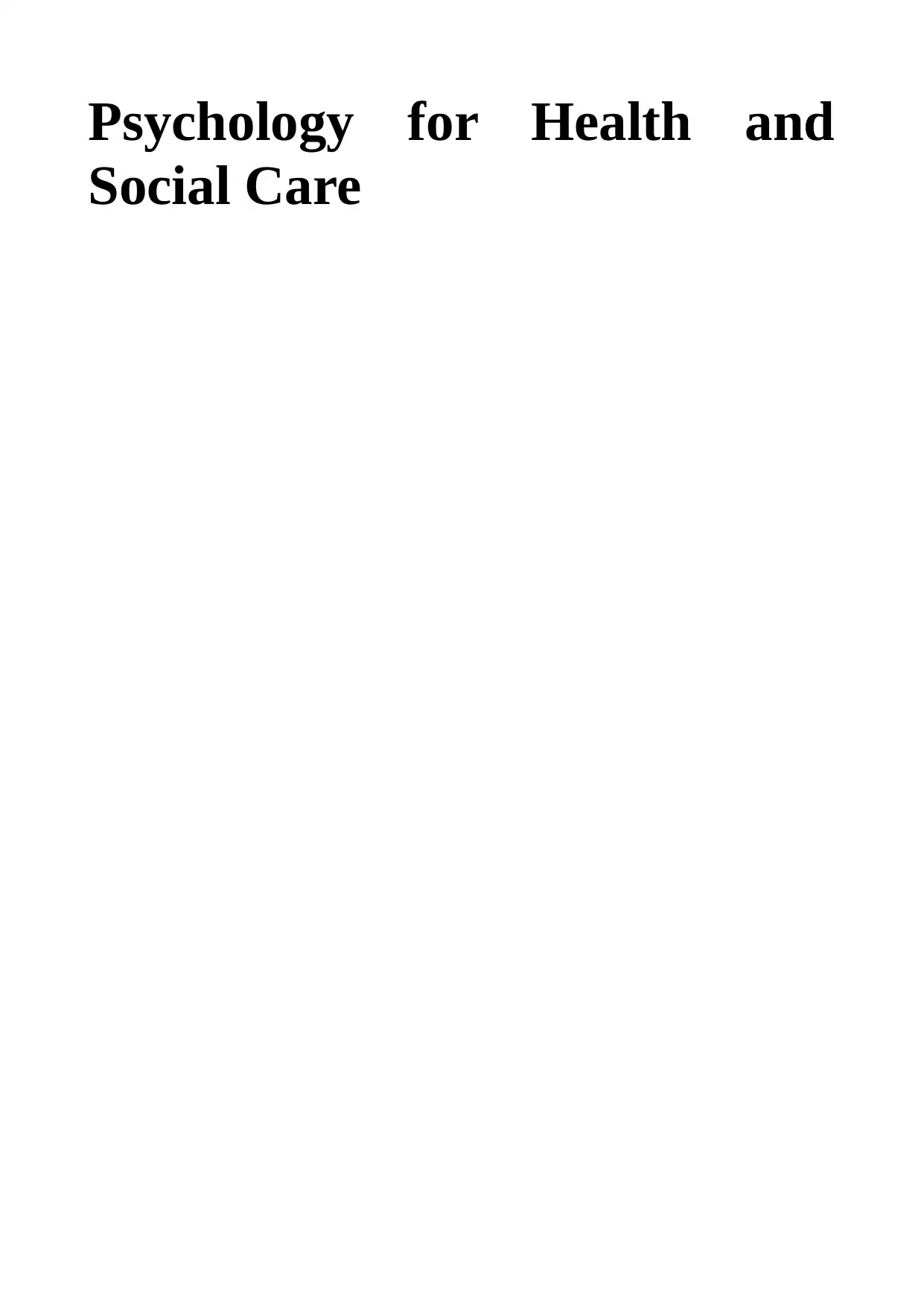
Psychology for Health and
Social Care
Social Care
Paraphrase This Document
Need a fresh take? Get an instant paraphrase of this document with our AI Paraphraser
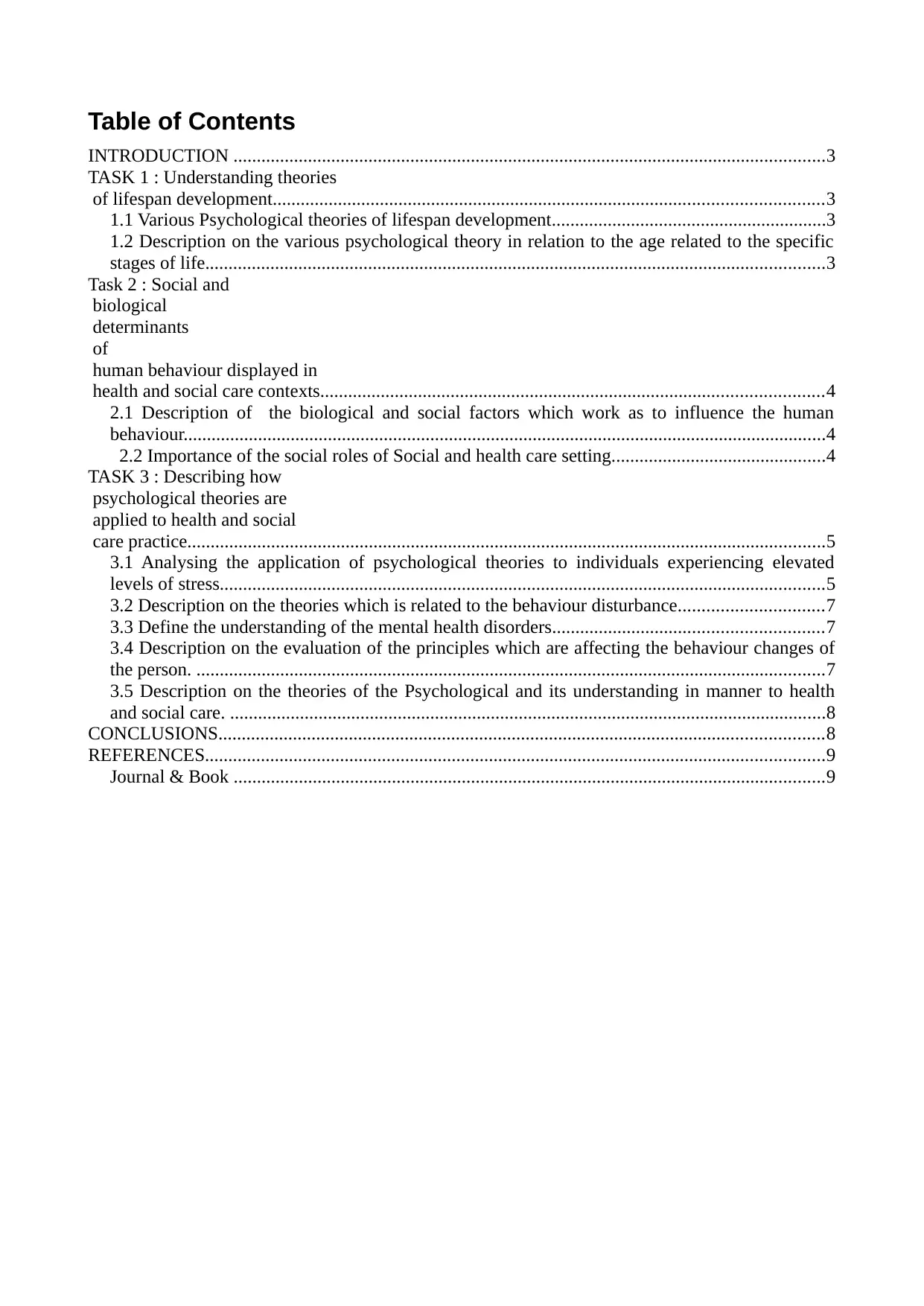
Table of Contents
INTRODUCTION ...............................................................................................................................3
TASK 1 : Understanding theories
of lifespan development......................................................................................................................3
1.1 Various Psychological theories of lifespan development...........................................................3
1.2 Description on the various psychological theory in relation to the age related to the specific
stages of life.....................................................................................................................................3
Task 2 : Social and
biological
determinants
of
human behaviour displayed in
health and social care contexts............................................................................................................4
2.1 Description of the biological and social factors which work as to influence the human
behaviour..........................................................................................................................................4
2.2 Importance of the social roles of Social and health care setting..............................................4
TASK 3 : Describing how
psychological theories are
applied to health and social
care practice.........................................................................................................................................5
3.1 Analysing the application of psychological theories to individuals experiencing elevated
levels of stress..................................................................................................................................5
3.2 Description on the theories which is related to the behaviour disturbance...............................7
3.3 Define the understanding of the mental health disorders..........................................................7
3.4 Description on the evaluation of the principles which are affecting the behaviour changes of
the person. .......................................................................................................................................7
3.5 Description on the theories of the Psychological and its understanding in manner to health
and social care. ................................................................................................................................8
CONCLUSIONS..................................................................................................................................8
REFERENCES.....................................................................................................................................9
Journal & Book ...............................................................................................................................9
INTRODUCTION ...............................................................................................................................3
TASK 1 : Understanding theories
of lifespan development......................................................................................................................3
1.1 Various Psychological theories of lifespan development...........................................................3
1.2 Description on the various psychological theory in relation to the age related to the specific
stages of life.....................................................................................................................................3
Task 2 : Social and
biological
determinants
of
human behaviour displayed in
health and social care contexts............................................................................................................4
2.1 Description of the biological and social factors which work as to influence the human
behaviour..........................................................................................................................................4
2.2 Importance of the social roles of Social and health care setting..............................................4
TASK 3 : Describing how
psychological theories are
applied to health and social
care practice.........................................................................................................................................5
3.1 Analysing the application of psychological theories to individuals experiencing elevated
levels of stress..................................................................................................................................5
3.2 Description on the theories which is related to the behaviour disturbance...............................7
3.3 Define the understanding of the mental health disorders..........................................................7
3.4 Description on the evaluation of the principles which are affecting the behaviour changes of
the person. .......................................................................................................................................7
3.5 Description on the theories of the Psychological and its understanding in manner to health
and social care. ................................................................................................................................8
CONCLUSIONS..................................................................................................................................8
REFERENCES.....................................................................................................................................9
Journal & Book ...............................................................................................................................9
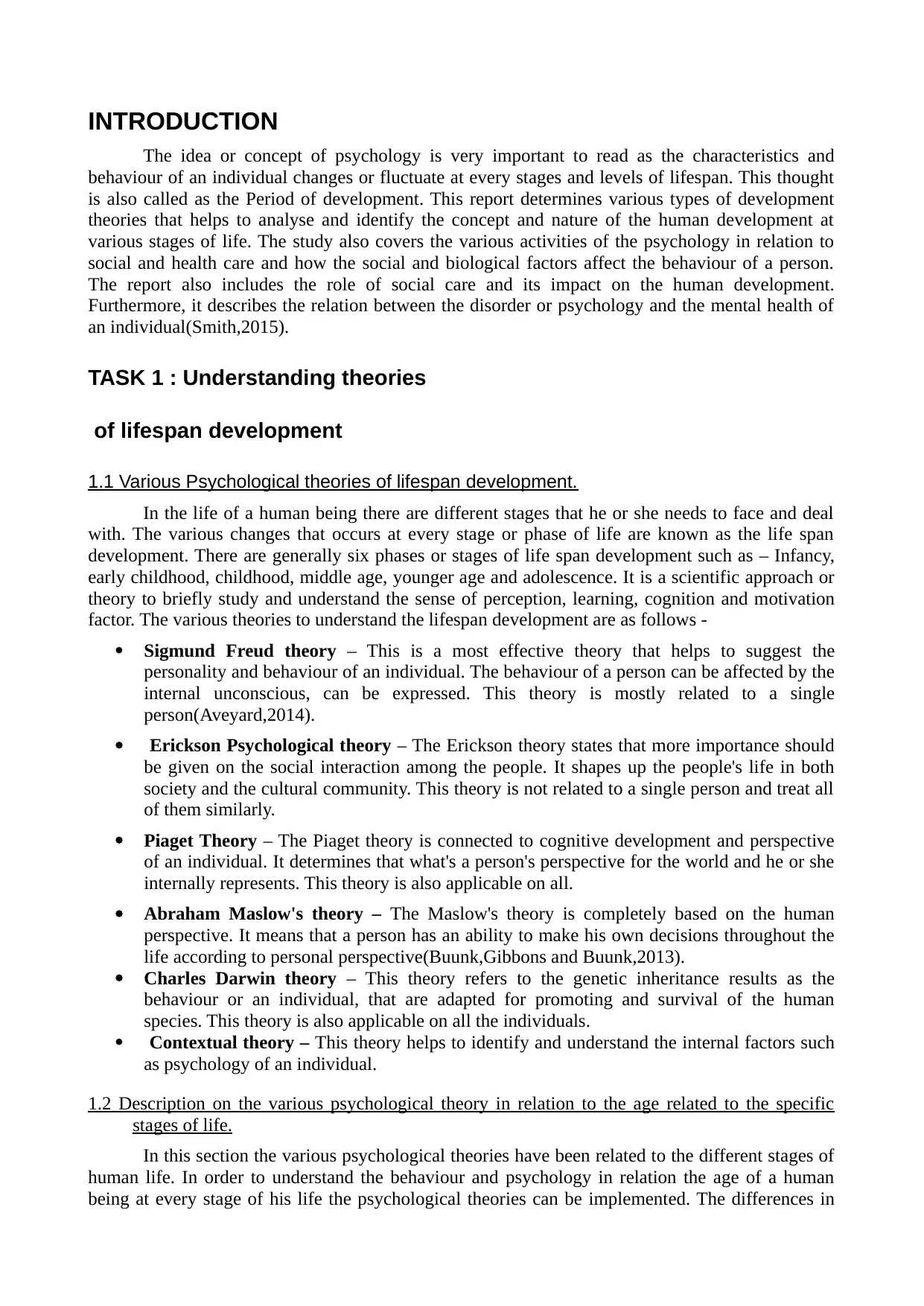
INTRODUCTION
The idea or concept of psychology is very important to read as the characteristics and
behaviour of an individual changes or fluctuate at every stages and levels of lifespan. This thought
is also called as the Period of development. This report determines various types of development
theories that helps to analyse and identify the concept and nature of the human development at
various stages of life. The study also covers the various activities of the psychology in relation to
social and health care and how the social and biological factors affect the behaviour of a person.
The report also includes the role of social care and its impact on the human development.
Furthermore, it describes the relation between the disorder or psychology and the mental health of
an individual(Smith,2015).
TASK 1 : Understanding theories
of lifespan development
1.1 Various Psychological theories of lifespan development.
In the life of a human being there are different stages that he or she needs to face and deal
with. The various changes that occurs at every stage or phase of life are known as the life span
development. There are generally six phases or stages of life span development such as – Infancy,
early childhood, childhood, middle age, younger age and adolescence. It is a scientific approach or
theory to briefly study and understand the sense of perception, learning, cognition and motivation
factor. The various theories to understand the lifespan development are as follows -
Sigmund Freud theory – This is a most effective theory that helps to suggest the
personality and behaviour of an individual. The behaviour of a person can be affected by the
internal unconscious, can be expressed. This theory is mostly related to a single
person(Aveyard,2014).
Erickson Psychological theory – The Erickson theory states that more importance should
be given on the social interaction among the people. It shapes up the people's life in both
society and the cultural community. This theory is not related to a single person and treat all
of them similarly.
Piaget Theory – The Piaget theory is connected to cognitive development and perspective
of an individual. It determines that what's a person's perspective for the world and he or she
internally represents. This theory is also applicable on all.
Abraham Maslow's theory – The Maslow's theory is completely based on the human
perspective. It means that a person has an ability to make his own decisions throughout the
life according to personal perspective(Buunk,Gibbons and Buunk,2013).
Charles Darwin theory – This theory refers to the genetic inheritance results as the
behaviour or an individual, that are adapted for promoting and survival of the human
species. This theory is also applicable on all the individuals.
Contextual theory – This theory helps to identify and understand the internal factors such
as psychology of an individual.
1.2 Description on the various psychological theory in relation to the age related to the specific
stages of life.
In this section the various psychological theories have been related to the different stages of
human life. In order to understand the behaviour and psychology in relation the age of a human
being at every stage of his life the psychological theories can be implemented. The differences in
The idea or concept of psychology is very important to read as the characteristics and
behaviour of an individual changes or fluctuate at every stages and levels of lifespan. This thought
is also called as the Period of development. This report determines various types of development
theories that helps to analyse and identify the concept and nature of the human development at
various stages of life. The study also covers the various activities of the psychology in relation to
social and health care and how the social and biological factors affect the behaviour of a person.
The report also includes the role of social care and its impact on the human development.
Furthermore, it describes the relation between the disorder or psychology and the mental health of
an individual(Smith,2015).
TASK 1 : Understanding theories
of lifespan development
1.1 Various Psychological theories of lifespan development.
In the life of a human being there are different stages that he or she needs to face and deal
with. The various changes that occurs at every stage or phase of life are known as the life span
development. There are generally six phases or stages of life span development such as – Infancy,
early childhood, childhood, middle age, younger age and adolescence. It is a scientific approach or
theory to briefly study and understand the sense of perception, learning, cognition and motivation
factor. The various theories to understand the lifespan development are as follows -
Sigmund Freud theory – This is a most effective theory that helps to suggest the
personality and behaviour of an individual. The behaviour of a person can be affected by the
internal unconscious, can be expressed. This theory is mostly related to a single
person(Aveyard,2014).
Erickson Psychological theory – The Erickson theory states that more importance should
be given on the social interaction among the people. It shapes up the people's life in both
society and the cultural community. This theory is not related to a single person and treat all
of them similarly.
Piaget Theory – The Piaget theory is connected to cognitive development and perspective
of an individual. It determines that what's a person's perspective for the world and he or she
internally represents. This theory is also applicable on all.
Abraham Maslow's theory – The Maslow's theory is completely based on the human
perspective. It means that a person has an ability to make his own decisions throughout the
life according to personal perspective(Buunk,Gibbons and Buunk,2013).
Charles Darwin theory – This theory refers to the genetic inheritance results as the
behaviour or an individual, that are adapted for promoting and survival of the human
species. This theory is also applicable on all the individuals.
Contextual theory – This theory helps to identify and understand the internal factors such
as psychology of an individual.
1.2 Description on the various psychological theory in relation to the age related to the specific
stages of life.
In this section the various psychological theories have been related to the different stages of
human life. In order to understand the behaviour and psychology in relation the age of a human
being at every stage of his life the psychological theories can be implemented. The differences in
⊘ This is a preview!⊘
Do you want full access?
Subscribe today to unlock all pages.

Trusted by 1+ million students worldwide
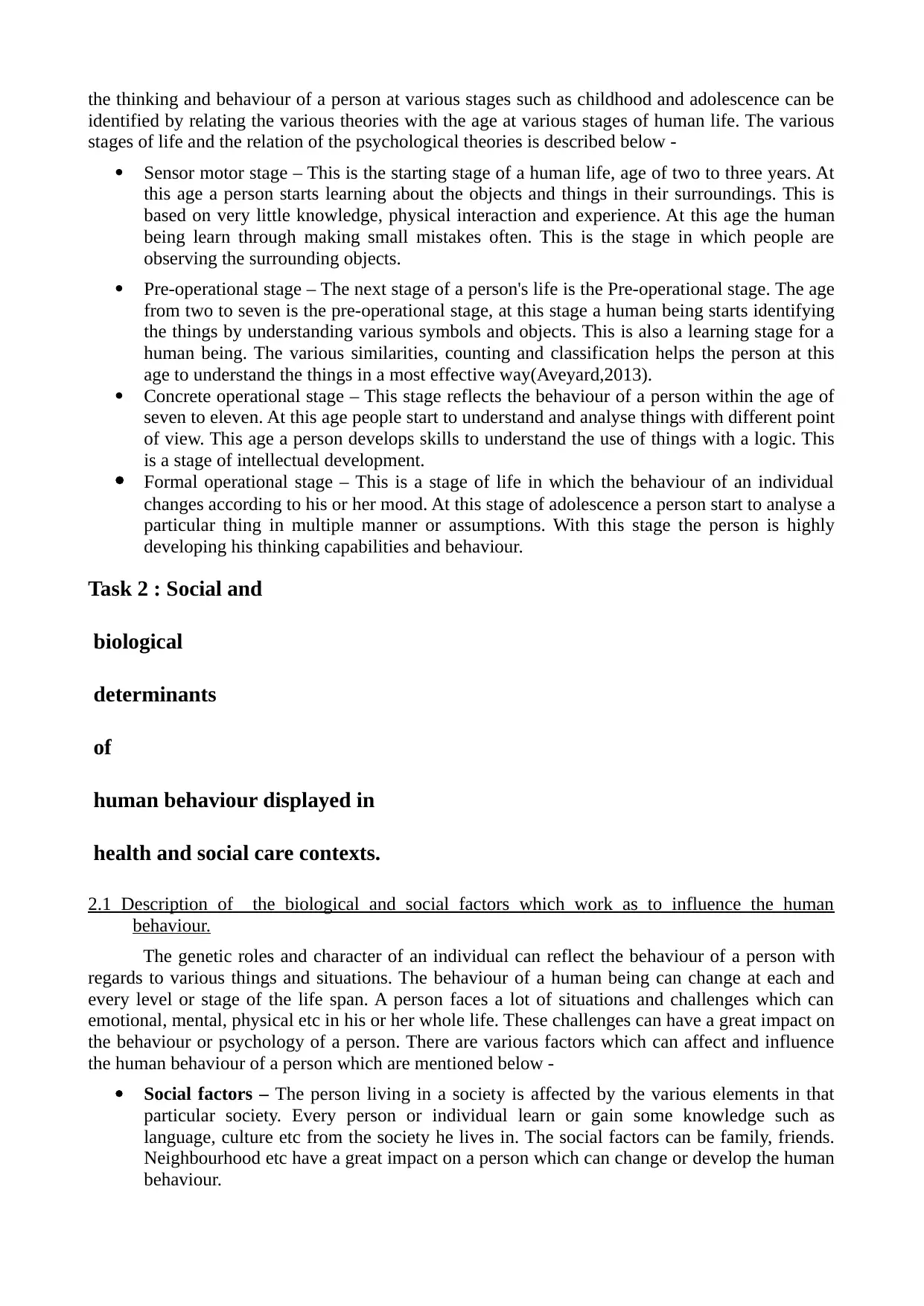
the thinking and behaviour of a person at various stages such as childhood and adolescence can be
identified by relating the various theories with the age at various stages of human life. The various
stages of life and the relation of the psychological theories is described below -
Sensor motor stage – This is the starting stage of a human life, age of two to three years. At
this age a person starts learning about the objects and things in their surroundings. This is
based on very little knowledge, physical interaction and experience. At this age the human
being learn through making small mistakes often. This is the stage in which people are
observing the surrounding objects.
Pre-operational stage – The next stage of a person's life is the Pre-operational stage. The age
from two to seven is the pre-operational stage, at this stage a human being starts identifying
the things by understanding various symbols and objects. This is also a learning stage for a
human being. The various similarities, counting and classification helps the person at this
age to understand the things in a most effective way(Aveyard,2013).
Concrete operational stage – This stage reflects the behaviour of a person within the age of
seven to eleven. At this age people start to understand and analyse things with different point
of view. This age a person develops skills to understand the use of things with a logic. This
is a stage of intellectual development.
Formal operational stage – This is a stage of life in which the behaviour of an individual
changes according to his or her mood. At this stage of adolescence a person start to analyse a
particular thing in multiple manner or assumptions. With this stage the person is highly
developing his thinking capabilities and behaviour.
Task 2 : Social and
biological
determinants
of
human behaviour displayed in
health and social care contexts.
2.1 Description of the biological and social factors which work as to influence the human
behaviour.
The genetic roles and character of an individual can reflect the behaviour of a person with
regards to various things and situations. The behaviour of a human being can change at each and
every level or stage of the life span. A person faces a lot of situations and challenges which can
emotional, mental, physical etc in his or her whole life. These challenges can have a great impact on
the behaviour or psychology of a person. There are various factors which can affect and influence
the human behaviour of a person which are mentioned below -
Social factors – The person living in a society is affected by the various elements in that
particular society. Every person or individual learn or gain some knowledge such as
language, culture etc from the society he lives in. The social factors can be family, friends.
Neighbourhood etc have a great impact on a person which can change or develop the human
behaviour.
identified by relating the various theories with the age at various stages of human life. The various
stages of life and the relation of the psychological theories is described below -
Sensor motor stage – This is the starting stage of a human life, age of two to three years. At
this age a person starts learning about the objects and things in their surroundings. This is
based on very little knowledge, physical interaction and experience. At this age the human
being learn through making small mistakes often. This is the stage in which people are
observing the surrounding objects.
Pre-operational stage – The next stage of a person's life is the Pre-operational stage. The age
from two to seven is the pre-operational stage, at this stage a human being starts identifying
the things by understanding various symbols and objects. This is also a learning stage for a
human being. The various similarities, counting and classification helps the person at this
age to understand the things in a most effective way(Aveyard,2013).
Concrete operational stage – This stage reflects the behaviour of a person within the age of
seven to eleven. At this age people start to understand and analyse things with different point
of view. This age a person develops skills to understand the use of things with a logic. This
is a stage of intellectual development.
Formal operational stage – This is a stage of life in which the behaviour of an individual
changes according to his or her mood. At this stage of adolescence a person start to analyse a
particular thing in multiple manner or assumptions. With this stage the person is highly
developing his thinking capabilities and behaviour.
Task 2 : Social and
biological
determinants
of
human behaviour displayed in
health and social care contexts.
2.1 Description of the biological and social factors which work as to influence the human
behaviour.
The genetic roles and character of an individual can reflect the behaviour of a person with
regards to various things and situations. The behaviour of a human being can change at each and
every level or stage of the life span. A person faces a lot of situations and challenges which can
emotional, mental, physical etc in his or her whole life. These challenges can have a great impact on
the behaviour or psychology of a person. There are various factors which can affect and influence
the human behaviour of a person which are mentioned below -
Social factors – The person living in a society is affected by the various elements in that
particular society. Every person or individual learn or gain some knowledge such as
language, culture etc from the society he lives in. The social factors can be family, friends.
Neighbourhood etc have a great impact on a person which can change or develop the human
behaviour.
Paraphrase This Document
Need a fresh take? Get an instant paraphrase of this document with our AI Paraphraser
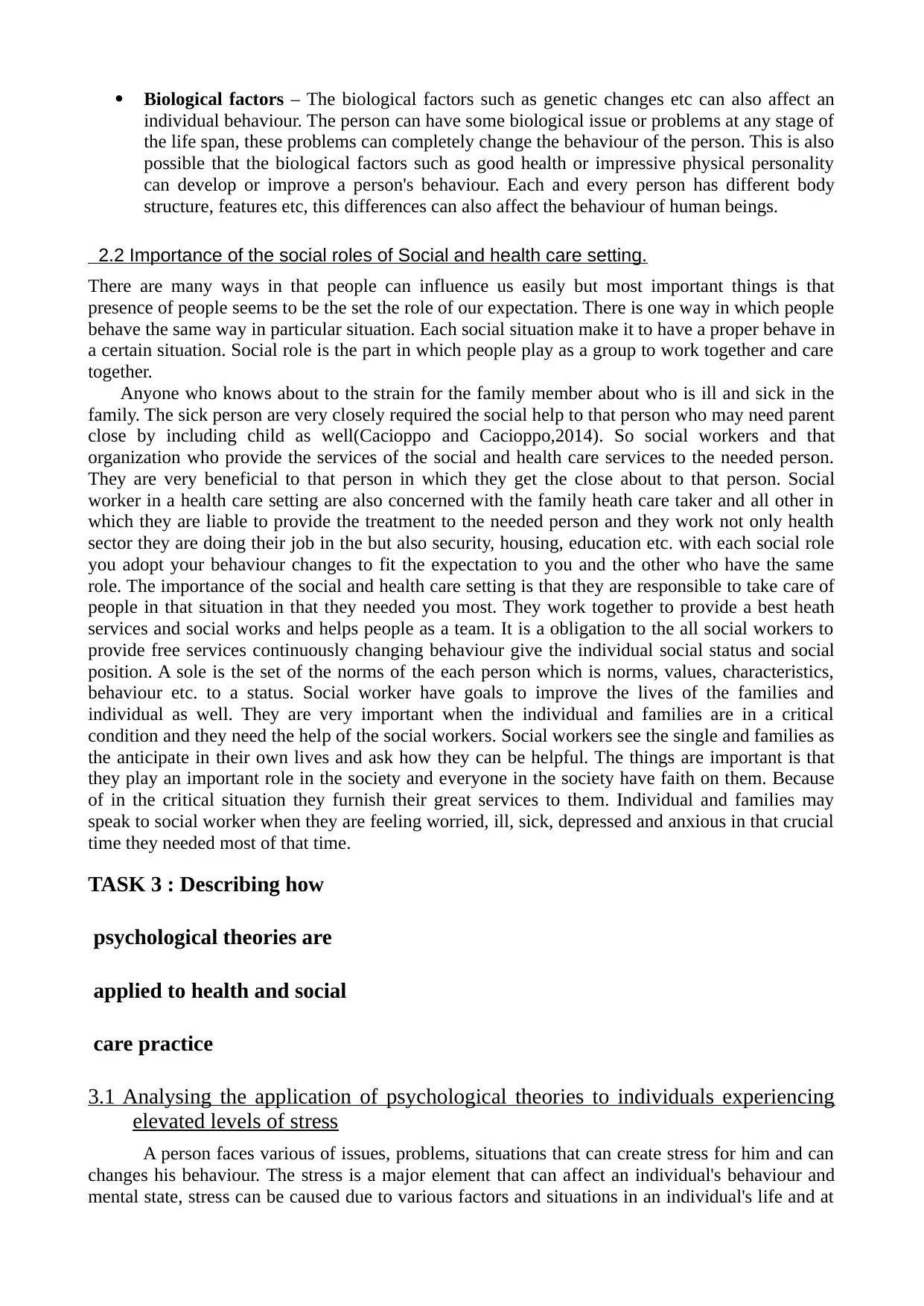
Biological factors – The biological factors such as genetic changes etc can also affect an
individual behaviour. The person can have some biological issue or problems at any stage of
the life span, these problems can completely change the behaviour of the person. This is also
possible that the biological factors such as good health or impressive physical personality
can develop or improve a person's behaviour. Each and every person has different body
structure, features etc, this differences can also affect the behaviour of human beings.
2.2 Importance of the social roles of Social and health care setting.
There are many ways in that people can influence us easily but most important things is that
presence of people seems to be the set the role of our expectation. There is one way in which people
behave the same way in particular situation. Each social situation make it to have a proper behave in
a certain situation. Social role is the part in which people play as a group to work together and care
together.
Anyone who knows about to the strain for the family member about who is ill and sick in the
family. The sick person are very closely required the social help to that person who may need parent
close by including child as well(Cacioppo and Cacioppo,2014). So social workers and that
organization who provide the services of the social and health care services to the needed person.
They are very beneficial to that person in which they get the close about to that person. Social
worker in a health care setting are also concerned with the family heath care taker and all other in
which they are liable to provide the treatment to the needed person and they work not only health
sector they are doing their job in the but also security, housing, education etc. with each social role
you adopt your behaviour changes to fit the expectation to you and the other who have the same
role. The importance of the social and health care setting is that they are responsible to take care of
people in that situation in that they needed you most. They work together to provide a best heath
services and social works and helps people as a team. It is a obligation to the all social workers to
provide free services continuously changing behaviour give the individual social status and social
position. A sole is the set of the norms of the each person which is norms, values, characteristics,
behaviour etc. to a status. Social worker have goals to improve the lives of the families and
individual as well. They are very important when the individual and families are in a critical
condition and they need the help of the social workers. Social workers see the single and families as
the anticipate in their own lives and ask how they can be helpful. The things are important is that
they play an important role in the society and everyone in the society have faith on them. Because
of in the critical situation they furnish their great services to them. Individual and families may
speak to social worker when they are feeling worried, ill, sick, depressed and anxious in that crucial
time they needed most of that time.
TASK 3 : Describing how
psychological theories are
applied to health and social
care practice
3.1 Analysing the application of psychological theories to individuals experiencing
elevated levels of stress
A person faces various of issues, problems, situations that can create stress for him and can
changes his behaviour. The stress is a major element that can affect an individual's behaviour and
mental state, stress can be caused due to various factors and situations in an individual's life and at
individual behaviour. The person can have some biological issue or problems at any stage of
the life span, these problems can completely change the behaviour of the person. This is also
possible that the biological factors such as good health or impressive physical personality
can develop or improve a person's behaviour. Each and every person has different body
structure, features etc, this differences can also affect the behaviour of human beings.
2.2 Importance of the social roles of Social and health care setting.
There are many ways in that people can influence us easily but most important things is that
presence of people seems to be the set the role of our expectation. There is one way in which people
behave the same way in particular situation. Each social situation make it to have a proper behave in
a certain situation. Social role is the part in which people play as a group to work together and care
together.
Anyone who knows about to the strain for the family member about who is ill and sick in the
family. The sick person are very closely required the social help to that person who may need parent
close by including child as well(Cacioppo and Cacioppo,2014). So social workers and that
organization who provide the services of the social and health care services to the needed person.
They are very beneficial to that person in which they get the close about to that person. Social
worker in a health care setting are also concerned with the family heath care taker and all other in
which they are liable to provide the treatment to the needed person and they work not only health
sector they are doing their job in the but also security, housing, education etc. with each social role
you adopt your behaviour changes to fit the expectation to you and the other who have the same
role. The importance of the social and health care setting is that they are responsible to take care of
people in that situation in that they needed you most. They work together to provide a best heath
services and social works and helps people as a team. It is a obligation to the all social workers to
provide free services continuously changing behaviour give the individual social status and social
position. A sole is the set of the norms of the each person which is norms, values, characteristics,
behaviour etc. to a status. Social worker have goals to improve the lives of the families and
individual as well. They are very important when the individual and families are in a critical
condition and they need the help of the social workers. Social workers see the single and families as
the anticipate in their own lives and ask how they can be helpful. The things are important is that
they play an important role in the society and everyone in the society have faith on them. Because
of in the critical situation they furnish their great services to them. Individual and families may
speak to social worker when they are feeling worried, ill, sick, depressed and anxious in that crucial
time they needed most of that time.
TASK 3 : Describing how
psychological theories are
applied to health and social
care practice
3.1 Analysing the application of psychological theories to individuals experiencing
elevated levels of stress
A person faces various of issues, problems, situations that can create stress for him and can
changes his behaviour. The stress is a major element that can affect an individual's behaviour and
mental state, stress can be caused due to various factors and situations in an individual's life and at
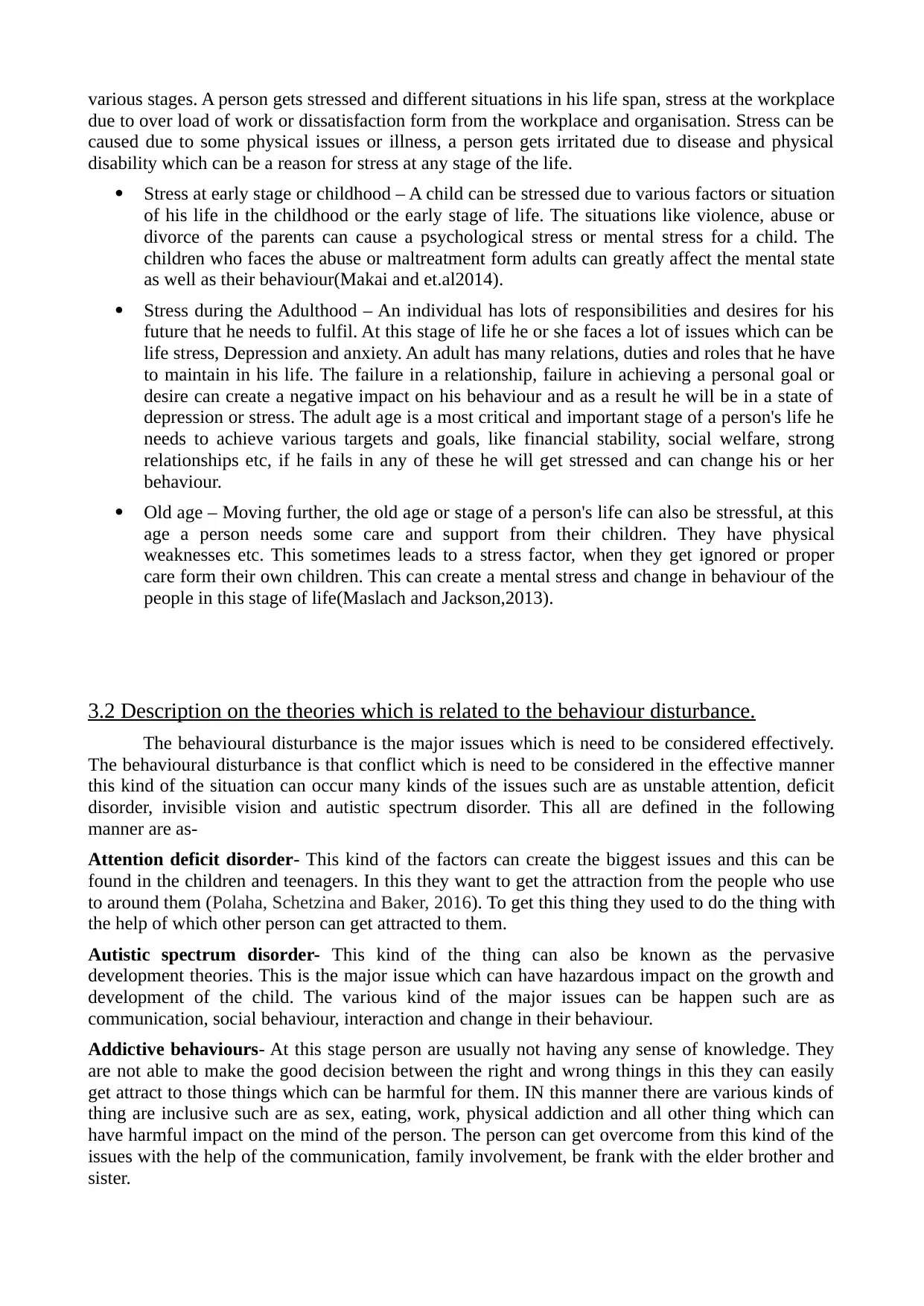
various stages. A person gets stressed and different situations in his life span, stress at the workplace
due to over load of work or dissatisfaction form from the workplace and organisation. Stress can be
caused due to some physical issues or illness, a person gets irritated due to disease and physical
disability which can be a reason for stress at any stage of the life.
Stress at early stage or childhood – A child can be stressed due to various factors or situation
of his life in the childhood or the early stage of life. The situations like violence, abuse or
divorce of the parents can cause a psychological stress or mental stress for a child. The
children who faces the abuse or maltreatment form adults can greatly affect the mental state
as well as their behaviour(Makai and et.al2014).
Stress during the Adulthood – An individual has lots of responsibilities and desires for his
future that he needs to fulfil. At this stage of life he or she faces a lot of issues which can be
life stress, Depression and anxiety. An adult has many relations, duties and roles that he have
to maintain in his life. The failure in a relationship, failure in achieving a personal goal or
desire can create a negative impact on his behaviour and as a result he will be in a state of
depression or stress. The adult age is a most critical and important stage of a person's life he
needs to achieve various targets and goals, like financial stability, social welfare, strong
relationships etc, if he fails in any of these he will get stressed and can change his or her
behaviour.
Old age – Moving further, the old age or stage of a person's life can also be stressful, at this
age a person needs some care and support from their children. They have physical
weaknesses etc. This sometimes leads to a stress factor, when they get ignored or proper
care form their own children. This can create a mental stress and change in behaviour of the
people in this stage of life(Maslach and Jackson,2013).
3.2 Description on the theories which is related to the behaviour disturbance.
The behavioural disturbance is the major issues which is need to be considered effectively.
The behavioural disturbance is that conflict which is need to be considered in the effective manner
this kind of the situation can occur many kinds of the issues such are as unstable attention, deficit
disorder, invisible vision and autistic spectrum disorder. This all are defined in the following
manner are as-
Attention deficit disorder- This kind of the factors can create the biggest issues and this can be
found in the children and teenagers. In this they want to get the attraction from the people who use
to around them (Polaha, Schetzina and Baker, 2016). To get this thing they used to do the thing with
the help of which other person can get attracted to them.
Autistic spectrum disorder- This kind of the thing can also be known as the pervasive
development theories. This is the major issue which can have hazardous impact on the growth and
development of the child. The various kind of the major issues can be happen such are as
communication, social behaviour, interaction and change in their behaviour.
Addictive behaviours- At this stage person are usually not having any sense of knowledge. They
are not able to make the good decision between the right and wrong things in this they can easily
get attract to those things which can be harmful for them. IN this manner there are various kinds of
thing are inclusive such are as sex, eating, work, physical addiction and all other thing which can
have harmful impact on the mind of the person. The person can get overcome from this kind of the
issues with the help of the communication, family involvement, be frank with the elder brother and
sister.
due to over load of work or dissatisfaction form from the workplace and organisation. Stress can be
caused due to some physical issues or illness, a person gets irritated due to disease and physical
disability which can be a reason for stress at any stage of the life.
Stress at early stage or childhood – A child can be stressed due to various factors or situation
of his life in the childhood or the early stage of life. The situations like violence, abuse or
divorce of the parents can cause a psychological stress or mental stress for a child. The
children who faces the abuse or maltreatment form adults can greatly affect the mental state
as well as their behaviour(Makai and et.al2014).
Stress during the Adulthood – An individual has lots of responsibilities and desires for his
future that he needs to fulfil. At this stage of life he or she faces a lot of issues which can be
life stress, Depression and anxiety. An adult has many relations, duties and roles that he have
to maintain in his life. The failure in a relationship, failure in achieving a personal goal or
desire can create a negative impact on his behaviour and as a result he will be in a state of
depression or stress. The adult age is a most critical and important stage of a person's life he
needs to achieve various targets and goals, like financial stability, social welfare, strong
relationships etc, if he fails in any of these he will get stressed and can change his or her
behaviour.
Old age – Moving further, the old age or stage of a person's life can also be stressful, at this
age a person needs some care and support from their children. They have physical
weaknesses etc. This sometimes leads to a stress factor, when they get ignored or proper
care form their own children. This can create a mental stress and change in behaviour of the
people in this stage of life(Maslach and Jackson,2013).
3.2 Description on the theories which is related to the behaviour disturbance.
The behavioural disturbance is the major issues which is need to be considered effectively.
The behavioural disturbance is that conflict which is need to be considered in the effective manner
this kind of the situation can occur many kinds of the issues such are as unstable attention, deficit
disorder, invisible vision and autistic spectrum disorder. This all are defined in the following
manner are as-
Attention deficit disorder- This kind of the factors can create the biggest issues and this can be
found in the children and teenagers. In this they want to get the attraction from the people who use
to around them (Polaha, Schetzina and Baker, 2016). To get this thing they used to do the thing with
the help of which other person can get attracted to them.
Autistic spectrum disorder- This kind of the thing can also be known as the pervasive
development theories. This is the major issue which can have hazardous impact on the growth and
development of the child. The various kind of the major issues can be happen such are as
communication, social behaviour, interaction and change in their behaviour.
Addictive behaviours- At this stage person are usually not having any sense of knowledge. They
are not able to make the good decision between the right and wrong things in this they can easily
get attract to those things which can be harmful for them. IN this manner there are various kinds of
thing are inclusive such are as sex, eating, work, physical addiction and all other thing which can
have harmful impact on the mind of the person. The person can get overcome from this kind of the
issues with the help of the communication, family involvement, be frank with the elder brother and
sister.
⊘ This is a preview!⊘
Do you want full access?
Subscribe today to unlock all pages.

Trusted by 1+ million students worldwide
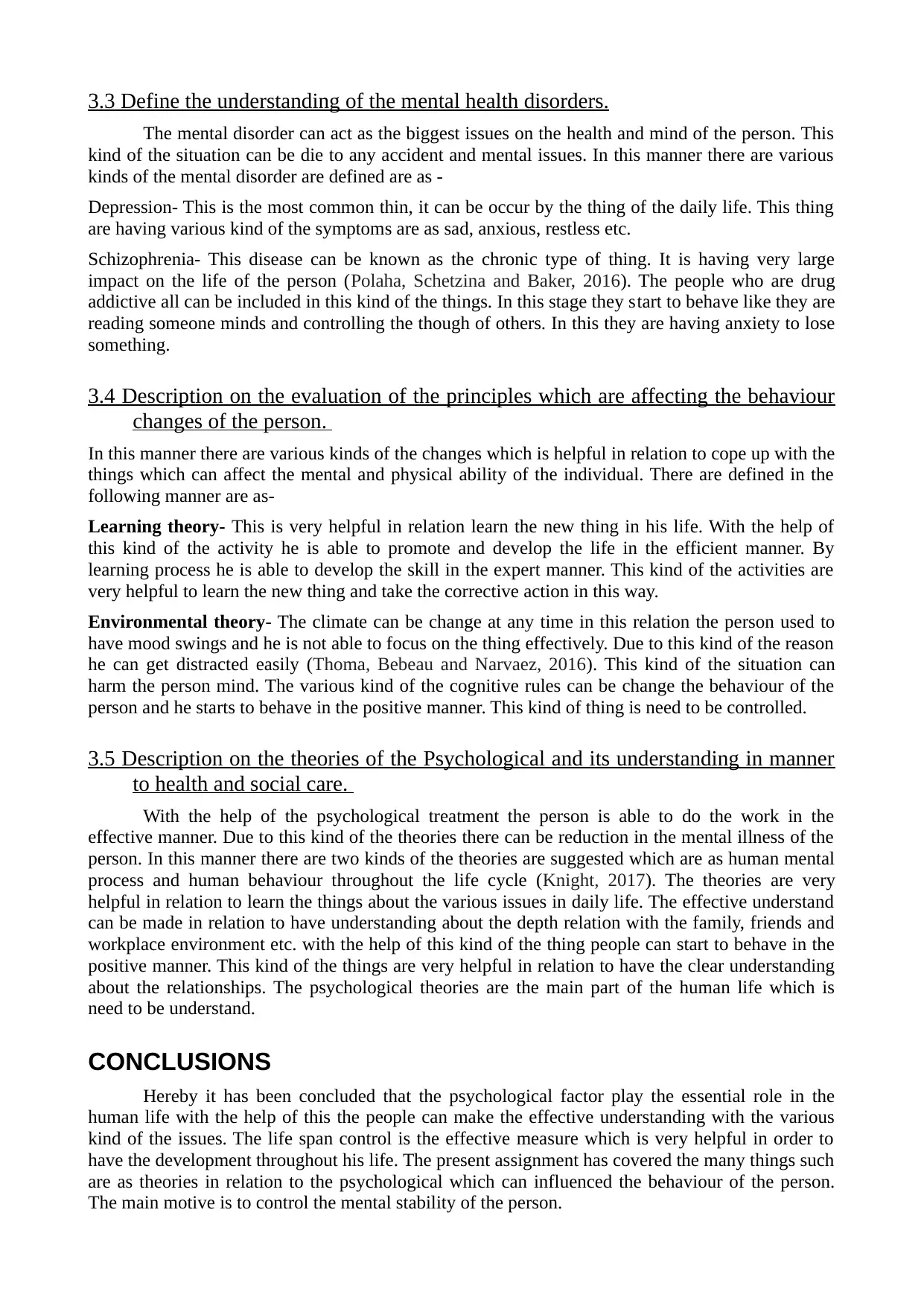
3.3 Define the understanding of the mental health disorders.
The mental disorder can act as the biggest issues on the health and mind of the person. This
kind of the situation can be die to any accident and mental issues. In this manner there are various
kinds of the mental disorder are defined are as -
Depression- This is the most common thin, it can be occur by the thing of the daily life. This thing
are having various kind of the symptoms are as sad, anxious, restless etc.
Schizophrenia- This disease can be known as the chronic type of thing. It is having very large
impact on the life of the person (Polaha, Schetzina and Baker, 2016). The people who are drug
addictive all can be included in this kind of the things. In this stage they start to behave like they are
reading someone minds and controlling the though of others. In this they are having anxiety to lose
something.
3.4 Description on the evaluation of the principles which are affecting the behaviour
changes of the person.
In this manner there are various kinds of the changes which is helpful in relation to cope up with the
things which can affect the mental and physical ability of the individual. There are defined in the
following manner are as-
Learning theory- This is very helpful in relation learn the new thing in his life. With the help of
this kind of the activity he is able to promote and develop the life in the efficient manner. By
learning process he is able to develop the skill in the expert manner. This kind of the activities are
very helpful to learn the new thing and take the corrective action in this way.
Environmental theory- The climate can be change at any time in this relation the person used to
have mood swings and he is not able to focus on the thing effectively. Due to this kind of the reason
he can get distracted easily (Thoma, Bebeau and Narvaez, 2016). This kind of the situation can
harm the person mind. The various kind of the cognitive rules can be change the behaviour of the
person and he starts to behave in the positive manner. This kind of thing is need to be controlled.
3.5 Description on the theories of the Psychological and its understanding in manner
to health and social care.
With the help of the psychological treatment the person is able to do the work in the
effective manner. Due to this kind of the theories there can be reduction in the mental illness of the
person. In this manner there are two kinds of the theories are suggested which are as human mental
process and human behaviour throughout the life cycle (Knight, 2017). The theories are very
helpful in relation to learn the things about the various issues in daily life. The effective understand
can be made in relation to have understanding about the depth relation with the family, friends and
workplace environment etc. with the help of this kind of the thing people can start to behave in the
positive manner. This kind of the things are very helpful in relation to have the clear understanding
about the relationships. The psychological theories are the main part of the human life which is
need to be understand.
CONCLUSIONS
Hereby it has been concluded that the psychological factor play the essential role in the
human life with the help of this the people can make the effective understanding with the various
kind of the issues. The life span control is the effective measure which is very helpful in order to
have the development throughout his life. The present assignment has covered the many things such
are as theories in relation to the psychological which can influenced the behaviour of the person.
The main motive is to control the mental stability of the person.
The mental disorder can act as the biggest issues on the health and mind of the person. This
kind of the situation can be die to any accident and mental issues. In this manner there are various
kinds of the mental disorder are defined are as -
Depression- This is the most common thin, it can be occur by the thing of the daily life. This thing
are having various kind of the symptoms are as sad, anxious, restless etc.
Schizophrenia- This disease can be known as the chronic type of thing. It is having very large
impact on the life of the person (Polaha, Schetzina and Baker, 2016). The people who are drug
addictive all can be included in this kind of the things. In this stage they start to behave like they are
reading someone minds and controlling the though of others. In this they are having anxiety to lose
something.
3.4 Description on the evaluation of the principles which are affecting the behaviour
changes of the person.
In this manner there are various kinds of the changes which is helpful in relation to cope up with the
things which can affect the mental and physical ability of the individual. There are defined in the
following manner are as-
Learning theory- This is very helpful in relation learn the new thing in his life. With the help of
this kind of the activity he is able to promote and develop the life in the efficient manner. By
learning process he is able to develop the skill in the expert manner. This kind of the activities are
very helpful to learn the new thing and take the corrective action in this way.
Environmental theory- The climate can be change at any time in this relation the person used to
have mood swings and he is not able to focus on the thing effectively. Due to this kind of the reason
he can get distracted easily (Thoma, Bebeau and Narvaez, 2016). This kind of the situation can
harm the person mind. The various kind of the cognitive rules can be change the behaviour of the
person and he starts to behave in the positive manner. This kind of thing is need to be controlled.
3.5 Description on the theories of the Psychological and its understanding in manner
to health and social care.
With the help of the psychological treatment the person is able to do the work in the
effective manner. Due to this kind of the theories there can be reduction in the mental illness of the
person. In this manner there are two kinds of the theories are suggested which are as human mental
process and human behaviour throughout the life cycle (Knight, 2017). The theories are very
helpful in relation to learn the things about the various issues in daily life. The effective understand
can be made in relation to have understanding about the depth relation with the family, friends and
workplace environment etc. with the help of this kind of the thing people can start to behave in the
positive manner. This kind of the things are very helpful in relation to have the clear understanding
about the relationships. The psychological theories are the main part of the human life which is
need to be understand.
CONCLUSIONS
Hereby it has been concluded that the psychological factor play the essential role in the
human life with the help of this the people can make the effective understanding with the various
kind of the issues. The life span control is the effective measure which is very helpful in order to
have the development throughout his life. The present assignment has covered the many things such
are as theories in relation to the psychological which can influenced the behaviour of the person.
The main motive is to control the mental stability of the person.
Paraphrase This Document
Need a fresh take? Get an instant paraphrase of this document with our AI Paraphraser
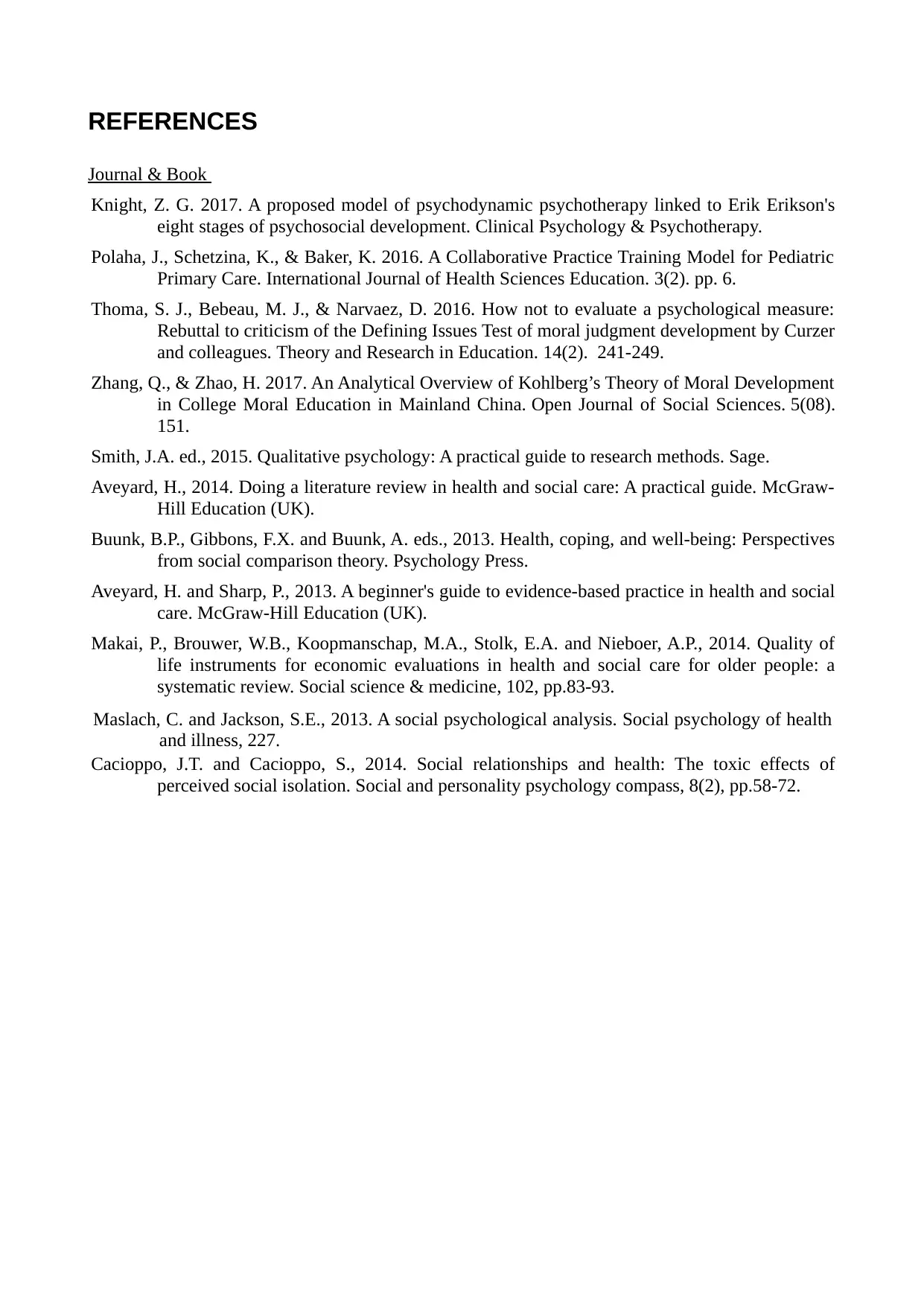
REFERENCES
Journal & Book
Knight, Z. G. 2017. A proposed model of psychodynamic psychotherapy linked to Erik Erikson's
eight stages of psychosocial development. Clinical Psychology & Psychotherapy.
Polaha, J., Schetzina, K., & Baker, K. 2016. A Collaborative Practice Training Model for Pediatric
Primary Care. International Journal of Health Sciences Education. 3(2). pp. 6.
Thoma, S. J., Bebeau, M. J., & Narvaez, D. 2016. How not to evaluate a psychological measure:
Rebuttal to criticism of the Defining Issues Test of moral judgment development by Curzer
and colleagues. Theory and Research in Education. 14(2). 241-249.
Zhang, Q., & Zhao, H. 2017. An Analytical Overview of Kohlberg’s Theory of Moral Development
in College Moral Education in Mainland China. Open Journal of Social Sciences. 5(08).
151.
Smith, J.A. ed., 2015. Qualitative psychology: A practical guide to research methods. Sage.
Aveyard, H., 2014. Doing a literature review in health and social care: A practical guide. McGraw-
Hill Education (UK).
Buunk, B.P., Gibbons, F.X. and Buunk, A. eds., 2013. Health, coping, and well-being: Perspectives
from social comparison theory. Psychology Press.
Aveyard, H. and Sharp, P., 2013. A beginner's guide to evidence-based practice in health and social
care. McGraw-Hill Education (UK).
Makai, P., Brouwer, W.B., Koopmanschap, M.A., Stolk, E.A. and Nieboer, A.P., 2014. Quality of
life instruments for economic evaluations in health and social care for older people: a
systematic review. Social science & medicine, 102, pp.83-93.
Maslach, C. and Jackson, S.E., 2013. A social psychological analysis. Social psychology of health
and illness, 227.
Cacioppo, J.T. and Cacioppo, S., 2014. Social relationships and health: The toxic effects of
perceived social isolation. Social and personality psychology compass, 8(2), pp.58-72.
Journal & Book
Knight, Z. G. 2017. A proposed model of psychodynamic psychotherapy linked to Erik Erikson's
eight stages of psychosocial development. Clinical Psychology & Psychotherapy.
Polaha, J., Schetzina, K., & Baker, K. 2016. A Collaborative Practice Training Model for Pediatric
Primary Care. International Journal of Health Sciences Education. 3(2). pp. 6.
Thoma, S. J., Bebeau, M. J., & Narvaez, D. 2016. How not to evaluate a psychological measure:
Rebuttal to criticism of the Defining Issues Test of moral judgment development by Curzer
and colleagues. Theory and Research in Education. 14(2). 241-249.
Zhang, Q., & Zhao, H. 2017. An Analytical Overview of Kohlberg’s Theory of Moral Development
in College Moral Education in Mainland China. Open Journal of Social Sciences. 5(08).
151.
Smith, J.A. ed., 2015. Qualitative psychology: A practical guide to research methods. Sage.
Aveyard, H., 2014. Doing a literature review in health and social care: A practical guide. McGraw-
Hill Education (UK).
Buunk, B.P., Gibbons, F.X. and Buunk, A. eds., 2013. Health, coping, and well-being: Perspectives
from social comparison theory. Psychology Press.
Aveyard, H. and Sharp, P., 2013. A beginner's guide to evidence-based practice in health and social
care. McGraw-Hill Education (UK).
Makai, P., Brouwer, W.B., Koopmanschap, M.A., Stolk, E.A. and Nieboer, A.P., 2014. Quality of
life instruments for economic evaluations in health and social care for older people: a
systematic review. Social science & medicine, 102, pp.83-93.
Maslach, C. and Jackson, S.E., 2013. A social psychological analysis. Social psychology of health
and illness, 227.
Cacioppo, J.T. and Cacioppo, S., 2014. Social relationships and health: The toxic effects of
perceived social isolation. Social and personality psychology compass, 8(2), pp.58-72.
1 out of 8
Related Documents
Your All-in-One AI-Powered Toolkit for Academic Success.
+13062052269
info@desklib.com
Available 24*7 on WhatsApp / Email
![[object Object]](/_next/static/media/star-bottom.7253800d.svg)
Unlock your academic potential
Copyright © 2020–2025 A2Z Services. All Rights Reserved. Developed and managed by ZUCOL.





